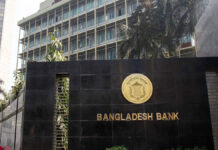Bangladesh Bank aims to bring average inflation down to 7 percent using the 1995-96 base year and to ensure a credit growth that stimulates inclusive economic expansion.
The objectives were outlined as the central bank announced the Monetary Policy Statement (MPS) for the first six months of the current 2013-14 fiscal year at its headquarters in the capital on Thursday.
The monetary policy stance that BB will pursue in the July-December period is based on an assessment of global and domestic macro-economic conditions and outlook, it outlined.
The inflation target announced in the current budget is 7 percent using the 1995-96 base, which could be in the range of 6.0-6.5 percent using the 2005-06 base.
The central bank said the risks to the inflation target stem partly from likely wage increases in both the public and private sectors which will further add to existing aggregate demand pressures.
Another risk to food inflation in particular stems from possible supply-side disruptions, if prolonged nationwide strikes take place, recent increases in food inflation in India and as in all years risk due to weather related factors affecting agriculture.
The central bank specifically aims to contain reserve money growth to 15.5 percent and broad money growth to 17.2 percent by December 2013.
“The space for private sector credit growth of 15.5 percent for December 2013 and 16.5 percent in June 2014 has been kept well in line with economic growth targets and higher than the average of ‘emerging’ Asian economies.”
This level is sufficient to accommodate a substantial rise in demand for credit if it materialises though actual private credit growth may not use up all the space in the monetary program as it will depend on the investment climate in the lead-up to the national elections.
The bank has kept the repo rates and reserve requirement ratios unchanged, thanks to the growing inflationary pressures over the past several months
“Moreover the growing liquidity in the banking system suggests that an easing of reserve requirement ratios is also unnecessary,” it said.
The bank said strengthening credit and debt markets would remain a key focus for the July-December period for effective transmission of monetary policy.
“Overall there is a greater focus on improving corporate governance in banks as well as using automation and capacity building to strengthen BB supervision.”
The bank said specific actions within performance agreements for state-run commercial banks and specialised banks including Basic Bank include ceilings on loan growth and the need to provide regular reporting to BB on a number of issues including large loan approvals, single borrower exposure, off-balance sheet items etc.
“Clear progress on these benchmarks will be important before any recapitalisation of these banks,” it said.
The monetary policy stance also aims to preserve the country’s external sector stability.
“BB will continue to support a market-based exchange rate while seeking to avoid excessive foreign exchange rate volatility.”
Source: The Daily Star










